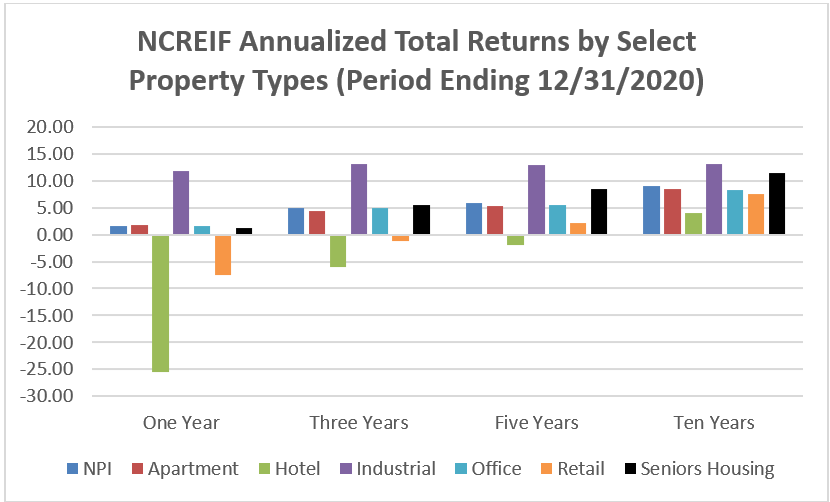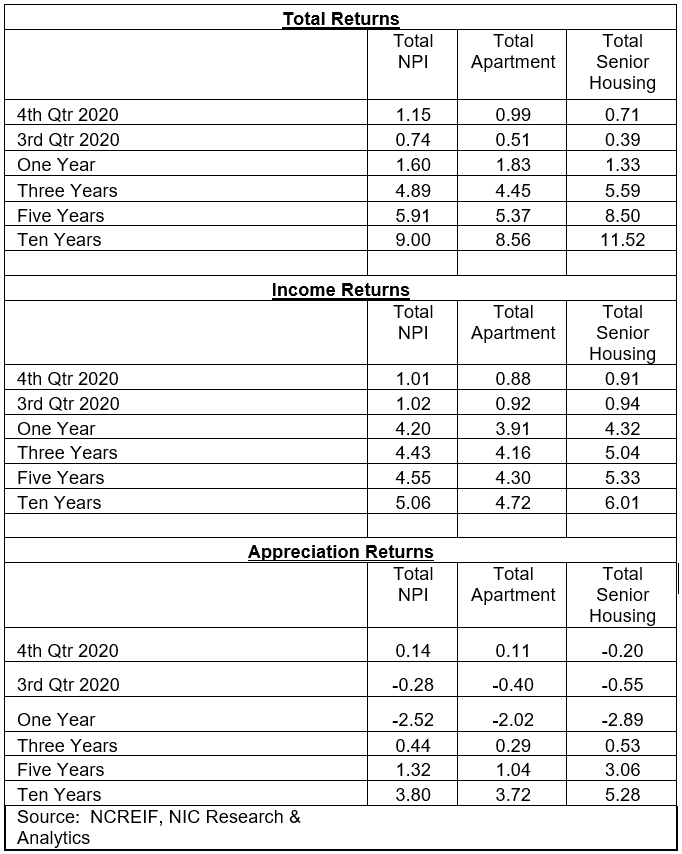The total investment return for the seniors housing sector was a positive 0.71% in the fourth quarter of 2020. This marked the second consecutive quarterly gain after one quarter of negative returns in the second quarter of 2020 when total returns were negative 1.00%; that marked the first negative total return since 2012 and prior to that in 2009.
The income return remained positive in the fourth quarter, but at 0.91% it was the smallest increase on record as far back as 2003. The appreciation (capital/valuation) return fell 0.20%, the fifth consecutive quarterly decline. This contrasts with the NPI and apartments, where the valuation return turned positive in the fourth quarter. Many investors have reduced their appreciation expectations for seniors housing as the impact of the coronavirus has weighed heavily on their view of the sector. The valuation return is the change in value net of any capital expenditures incurred during the quarter.
Further, the one-year valuation return for seniors housing was a negative 2.89%, worse than in the NPI (-2.52%), apartments (-2.02%), or office (-2.73%) types. Retail was a negative 11.17% and hotel had a shockingly large negative appreciation return of 24.10%. Meanwhile, investors’ darling—the industrial sector—enjoyed a 7.04% appreciation return on a one-year basis.
Note that the performance measurement cited above for seniors housing reflects the returns of 145 seniors housing properties valued at $7.8 billion in the fourth quarter 2020. This was the highest property count and market value in the NCREIF time series for seniors housing.


See my full Quarterly Highlight in the recent National Council of Real Estate Fiduciaries (NCREIF) Real Estate Performance Report.
About Beth Mace
Beth Burnham Mace is a special advisor to the National Investment Center for Seniors Housing & Care (NIC) focused exclusively on monitoring and reporting changes in capital markets impacting senior housing and care investments and operations. Mace served as Chief Economist and Director of Research and Analytics during her nine-year tenure on NIC’s leadership team. Before joining the NIC staff in 2014, Mace served on the NIC Board of Directors and chaired its Research Committee. She was also a director at AEW Capital Management and worked in the AEW Research Group for 17 years. Prior to joining AEW, Mace spent 10 years at Standard & Poor’s DRI/McGraw-Hill as director of its Regional Information Service. She also worked as a regional economist at Crocker Bank, and for the National Commission on Air Quality, the Brookings Institution, and Boston Edison. Mace is currently a member of the Institutional Real Estate Americas Editorial Advisory Board. In 2020, Mace was inducted into the McKnight’s Women of Distinction Hall of Honor. In 2014, she was appointed a fellow at the Homer Hoyt Institute and was awarded the title of a “Woman of Influence” in commercial real estate by Real Estate Forum Magazine and Globe Street. Mace earned an undergraduate degree from Mount Holyoke College and a master’s degree from the University of California. She also earned a Certified Business Economist™ designation from the National Association of Business Economists.
Connect with Beth Mace
Read More by Beth Mace